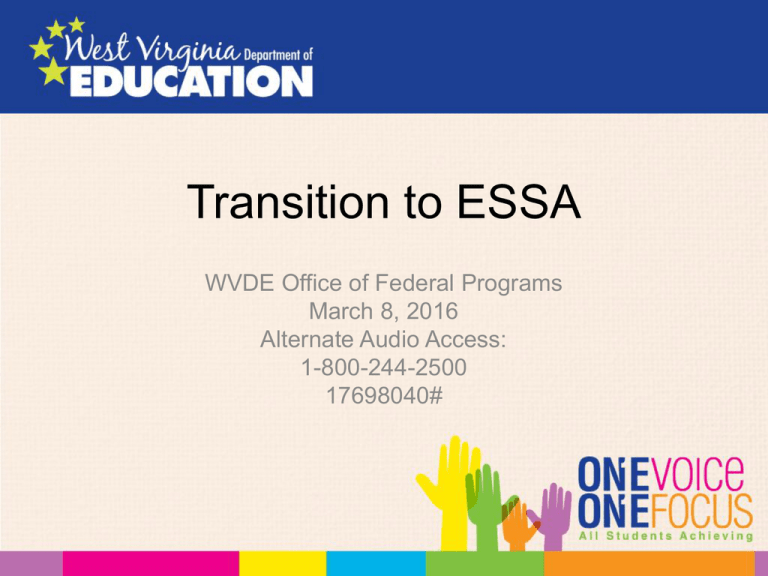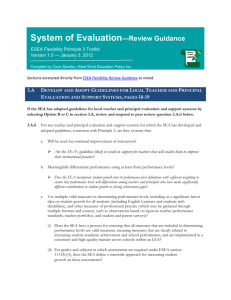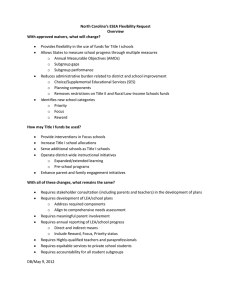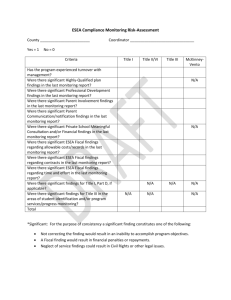Transition to ESSA WVDE Office of Federal Programs March 8, 2016
advertisement

Transition to ESSA WVDE Office of Federal Programs March 8, 2016 Alternate Audio Access: 1-800-244-2500 17698040# Agenda • • • • • • Overview Priority and Focus Schools ESEA Applications & Monitoring Title I, II and III Program Impact State Accountability in 2016-2017 Timeline for New ESEA Protocols ESSA Overview • December 10, 2015 signing of the Every Student Succeeds Act • Secretary providing guidance on transitioning from NCLB to ESSA www.ed.gov/essa • ESEA Flexibility null and void on August 1, 2016 Priority and Focus Schools • In accordance with section 5(e)(2)(B)(ii) of the ESSA, a State with priority and focus schools as identified under an approved ESEA flexibility request must continue to implement interventions applicable to such schools through the 2016-2017 school year. Priority and Focus Schools • WV will “freeze” its current lists of priority and focus schools as of December 9, 2015 (the day before the date of enactment of the ESSA). • These are the schools that will continue to implement their approved interventions through the remaining months of the 20152016 school year and in the 2016-2017 school years. Priority and Focus School Supports • School Improvement Funding (1003a,g) and Title II or RLIS for non-Title I • Bi-Monthly School T.A. Visits (Priority) • RESA support for focused interventions (Focus) ESEA Applications & Monitoring • Each state will make formula FY2016 (20162017 school year) subgrant allocations to LEAs in the same manner and using the same allocation formulas as it used for the 2015-2016 school year. • In general, each state and LEA receiving FY2016 funds will implement programs in the 2016-2017 school year in accordance with the NCLB requirements as they existed in the 2015-2016 year. ESEA Applications & Monitoring Exceptions Section 1111(h)(6)(B)(ii) of the ESEA, as amended by NCLB, which requires a school to notify parents when their child has been assigned to, or has been taught for four or more consecutive weeks by, a teacher who is not highly qualified ESEA Applications & Monitoring Exceptions Section 1119 of the ESEA, as amended by NCLB, which requires that each LEA hire highly qualified teachers; that each State and LEA report on progress toward all teachers being highly qualified; and that each LEA ensure that paraprofessionals meet certain qualifications and perform certain duties ESEA Applications & Monitoring Exceptions Section 2141 of the ESEA, as amended by NCLB, which requires an LEA not making progress toward all teachers being highly qualified to create and implement an improvement plan and requires the State to provide technical assistance to such LEA ESEA Applications & Monitoring Exceptions Section 3302(b) of the ESEA, as amended by NCLB, which requires each LEA receiving Title III funds that fails to meet one or more of the AMAOs to provide notice to parents of such failure ESEA Applications & Monitoring • Revised FY2016 Application -No Support Schools -Revised Narratives • Revised Consolidated Monitoring Document -Removal HQ -Removal Title III AMAOs Title I Program Requirements • A State and its LEAs must continue to comply with section 1119 of the ESEA, as amended by NCLB, through the 20152016 school year, including the requirement that a State and LEA report information related to highly qualified teachers based on the 2014–2015 and 2015–2016 school years. Title II Program Requirements The ESSA amended the Individuals with Disabilities Education Act (IDEA) by removing the definition of “highly qualified” in section 602(10) and the requirement in section 612(a)(14)(C) that special education teachers be “highly qualified” by the deadline established in section 1119(a)(2) of the ESEA, as amended by NCLB. Accordingly, a State is not required to ensure that special education teachers are “highly qualified” as defined in the ESEA beginning with the 2016-2017 school year. Title II Program Requirements • For 2016-2017 States are not required to comply with the requirements of section 2141 of ESEA, as amended by NCLB, that requires an LEA to take certain actions if it does not make progress toward all teachers being highly qualified and does not make AYP, including developing an improvement plan. Title II Program Requirements • For 2016-2017 Schools will no longer be required to provide notice to parents related to the highly qualified status of their child’s teacher. • Please note that LEAs are required to continue with section 1111(h)(6)(A) of the ESEA, as amended by NCLB, which requires an LEA to notify parents that they may request and the LEA will provide certain information regarding the professional qualifications of the student’s teachers and paraprofessionals, as appropriate Title III Program Requirements • A state is not required to make new accountability determinations based on 2014-2015 or 2015-2016 assessment data (as appropriate). • WV will freeze district accountability determinations under Title III based on the most recent AMAO calculations, and will continue to implement corresponding supports and interventions in those LEAs for the remaining months of the 2015-2016 school year and the 2016-2017 school year. State Accountability in 2016-2017 • Business rules for A-F are being finalized by WVBE. • First grades issued in the fall based on spring 2016 data. • Endeavor to include the required ESSA components in the final metrics. Accountability A-F Elementary & Middle ESSA Elementary & Middle • Proficiency on GSA • Observed & Adequate Growth Proficiency on State Test Measure of Student Growth/Other Academic Indicator Х English Language Proficiency Х One Indicator of School Quality or Success Accountability A-F High ESSA High • Proficiency on GSA • Observed & Adequate Growth • Graduation Rate Proficiency on State Test Four-year Graduation Rate Х English Language Proficiency Х One Indicator of School Quality or Success Timeline for New ESSA Protocols • Fall 2016 USED Guidance • Plan for SEA approval in early spring of 2017 • LEA plans in the summer of 2017 Questions





